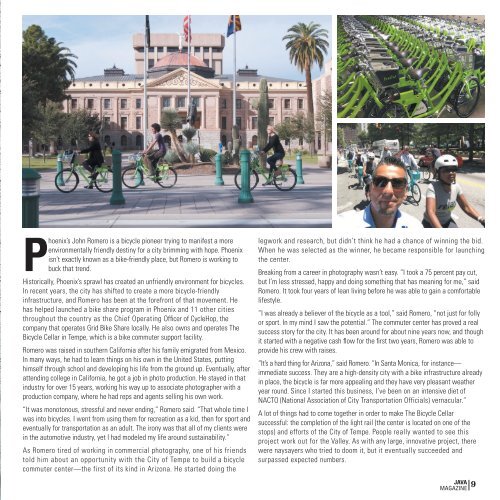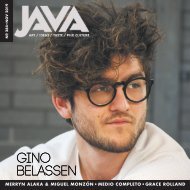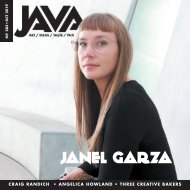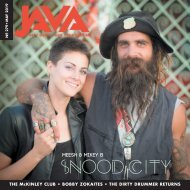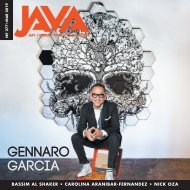Java.DEC.20162-2
You also want an ePaper? Increase the reach of your titles
YUMPU automatically turns print PDFs into web optimized ePapers that Google loves.
Phoenix’s John Romero is a bicycle pioneer trying to manifest a more<br />
environmentally friendly destiny for a city brimming with hope. Phoenix<br />
isn’t exactly known as a bike-friendly place, but Romero is working to<br />
buck that trend.<br />
Historically, Phoenix’s sprawl has created an unfriendly environment for bicycles.<br />
In recent years, the city has shifted to create a more bicycle-friendly<br />
infrastructure, and Romero has been at the forefront of that movement. He<br />
has helped launched a bike share program in Phoenix and 11 other cities<br />
throughout the country as the Chief Operating Officer of CycleHop, the<br />
company that operates Grid Bike Share locally. He also owns and operates The<br />
Bicycle Cellar in Tempe, which is a bike commuter support facility.<br />
Romero was raised in southern California after his family emigrated from Mexico.<br />
In many ways, he had to learn things on his own in the United States, putting<br />
himself through school and developing his life from the ground up. Eventually, after<br />
attending college in California, he got a job in photo production. He stayed in that<br />
industry for over 15 years, working his way up to associate photographer with a<br />
production company, where he had reps and agents selling his own work.<br />
“It was monotonous, stressful and never ending,” Romero said. “That whole time I<br />
was into bicycles. I went from using them for recreation as a kid, then for sport and<br />
eventually for transportation as an adult. The irony was that all of my clients were<br />
in the automotive industry, yet I had modeled my life around sustainability.”<br />
As Romero tired of working in commercial photography, one of his friends<br />
told him about an opportunity with the City of Tempe to build a bicycle<br />
commuter center—the first of its kind in Arizona. He started doing the<br />
legwork and research, but didn’t think he had a chance of winning the bid.<br />
When he was selected as the winner, he became responsible for launching<br />
the center.<br />
Breaking from a career in photography wasn’t easy. “I took a 75 percent pay cut,<br />
but I’m less stressed, happy and doing something that has meaning for me,” said<br />
Romero. It took four years of lean living before he was able to gain a comfortable<br />
lifestyle.<br />
“I was already a believer of the bicycle as a tool,” said Romero, “not just for folly<br />
or sport. In my mind I saw the potential.” The commuter center has proved a real<br />
success story for the city. It has been around for about nine years now, and though<br />
it started with a negative cash flow for the first two years, Romero was able to<br />
provide his crew with raises.<br />
“It’s a hard thing for Arizona,” said Romero. “In Santa Monica, for instance—<br />
immediate success. They are a high-density city with a bike infrastructure already<br />
in place, the bicycle is far more appealing and they have very pleasant weather<br />
year round. Since I started this business, I’ve been on an intensive diet of<br />
NACTO (National Association of City Transportation Officials) vernacular.”<br />
A lot of things had to come together in order to make The Bicycle Cellar<br />
successful: the completion of the light rail (the center is located on one of the<br />
stops) and efforts of the City of Tempe. People really wanted to see this<br />
project work out for the Valley. As with any large, innovative project, there<br />
were naysayers who tried to doom it, but it eventually succeeded and<br />
surpassed expected numbers.<br />
JAVA 9<br />
MAGAZINE


